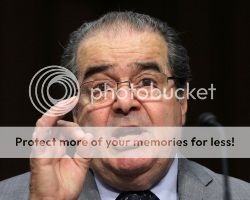
Justice Antonin Scalia
About once a year or so, Justice Antonin Scalia gets in front of a Catholic school assembly and tells the students that there is no constitutional tradition that says the state must be neutral on religion or free of religion. At least he is consistent. He is consistently wrong about separation of church and state.
Supreme Court Justice Antonin Scalia said Saturday the idea of religious neutrality is not grounded in the country’s constitutional traditions and that God has been good to the U.S. exactly because Americans honor him.
Scalia was speaking at a Catholic high school in the New Orleans suburb of Metairie, Louisiana. Scalia, who was appointed by President Ronald Reagan in 1986 is the court’s longest serving justice. He has consistently been one of the court’s more conservative members.
He told the audience at Archbishop Rummel High School that there is “no place” in the country’s constitutional traditions for the idea that the state must be neutral between religion and its absence.
“To tell you the truth there is no place for that in our constitutional tradition. Where did that come from?” he said. “To be sure, you can’t favor one denomination over another but can’t favor religion over non-religion?”
He also said there is “nothing wrong” with the idea of presidents and others invoking God in speeches. He said God has been good to America because Americans have honored him.
A high school student could prove Scalia wrong about Consitutional tradition concerning separation of church and state.
The first example and most obvious is the religious test clause found in Article VI, paragraph 3 of the Consitution:
The Senators and Representatives before mentioned, and the Members of the several State Legislatures, and all executive and judicial Officers, both of the United States and of the several States, shall be bound by Oath or Affirmation, to support this Constitution; but no religious test shall ever be required as a qualification to any office or public trust under the United States.
The 1961 US Supreme Court case Torcaso v. Watkins indirectly applied the test clause to the states through the 1st and 14th amendments although the decision didn’t specifically say the test clause made state laws requiring a religious test unconstitutional. It is understood that all state religious test laws are not enforceable.
In the 1947 case Everson v. Board of Education the court stated:
The “establishment of religion” clause of the First Amendment means at least this: Neither a state nor the Federal Government can set up a church. Neither can pass laws which aid one religion, aid all religions, or prefer one religion over another. Neither can force nor influence a person to go to or to remain away from church against his will or force him to profess a belief or disbelief in any religion.
From those cases, one has to conclude that when enacting laws or policy the government must be neutral when it comes to religion and must not exclude those with no religion. Unless Scalia is using an entirely different definition of neutrality.
Of course more recent court cases like Burwell v. Hobby Lobby and state and Federal Religious Freedom Restoration Acts have chipped away at government neutrality by allowing laws and policies to exempt those who are religious thus giving them special privileges.
For someone who comes across as a strict “originalist”, Scalia sure has based his current thinking on a more recent view by the court.
Scalia is also confusing politicians pandering to religious people by publicly invoking God’s name with invoking religion into public laws and policies. Those aren’t the same thing.
A President asking for God’s help after a some disaster may look stupid to some people but the spectacle doesn’t violate government neutrality directly. If the Congress passed a law giving tax dollars to churches because “we need to be on God’s good side” would be a violation of government neutrality.
A member of Congress might decide to vote for an unemployment bill because they want to be a good Christian and help the poor, but as long as the text of the bill doesn’t state that religious belief then it is neutral toward religion.
As Scalia refuses to comprehend, the motivations for some law or policy might be based in someone’s religious beliefs but as long as those beliefs aren’t codified into the law or policy there is no direct violation of government neutrality toward religion.
